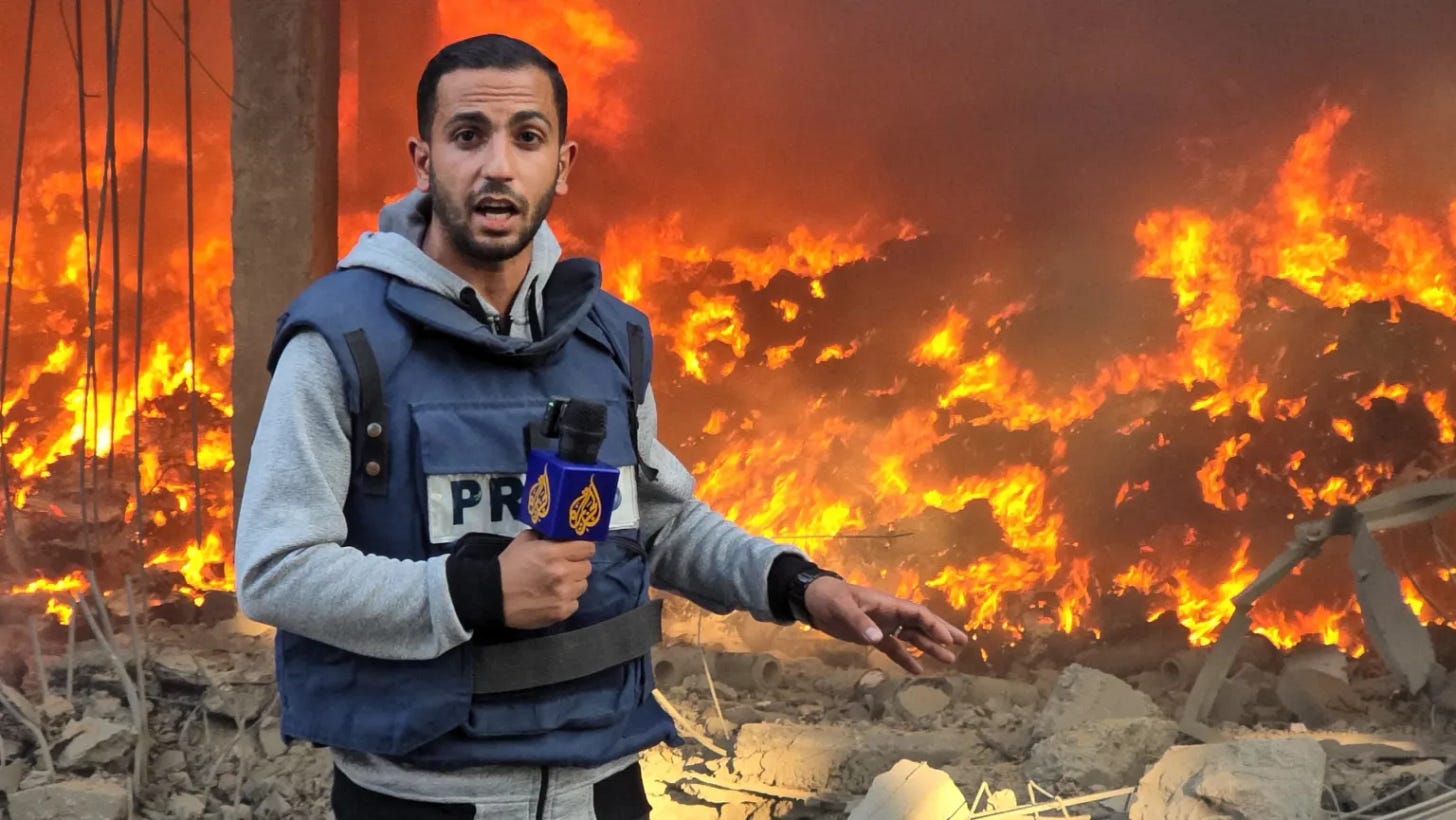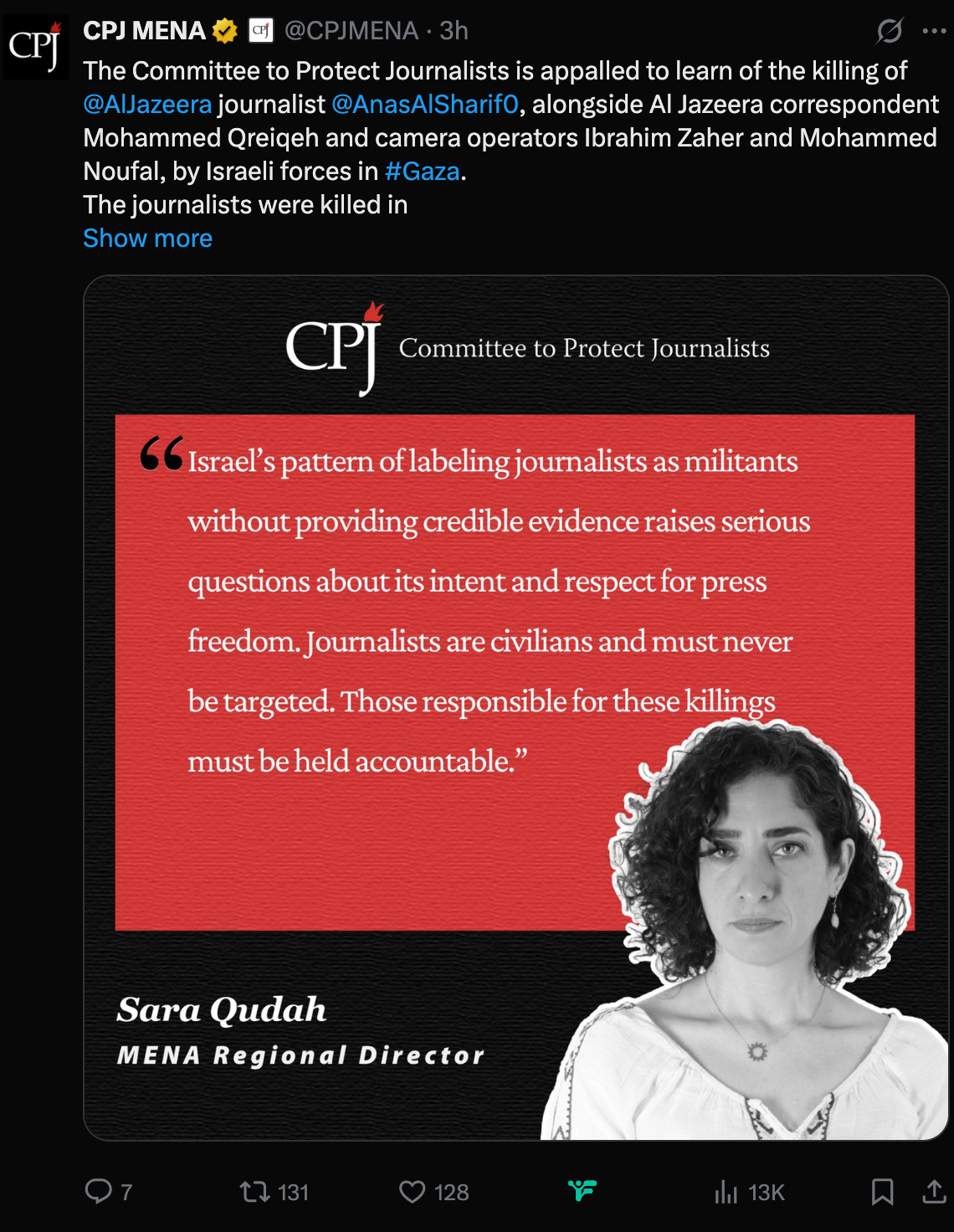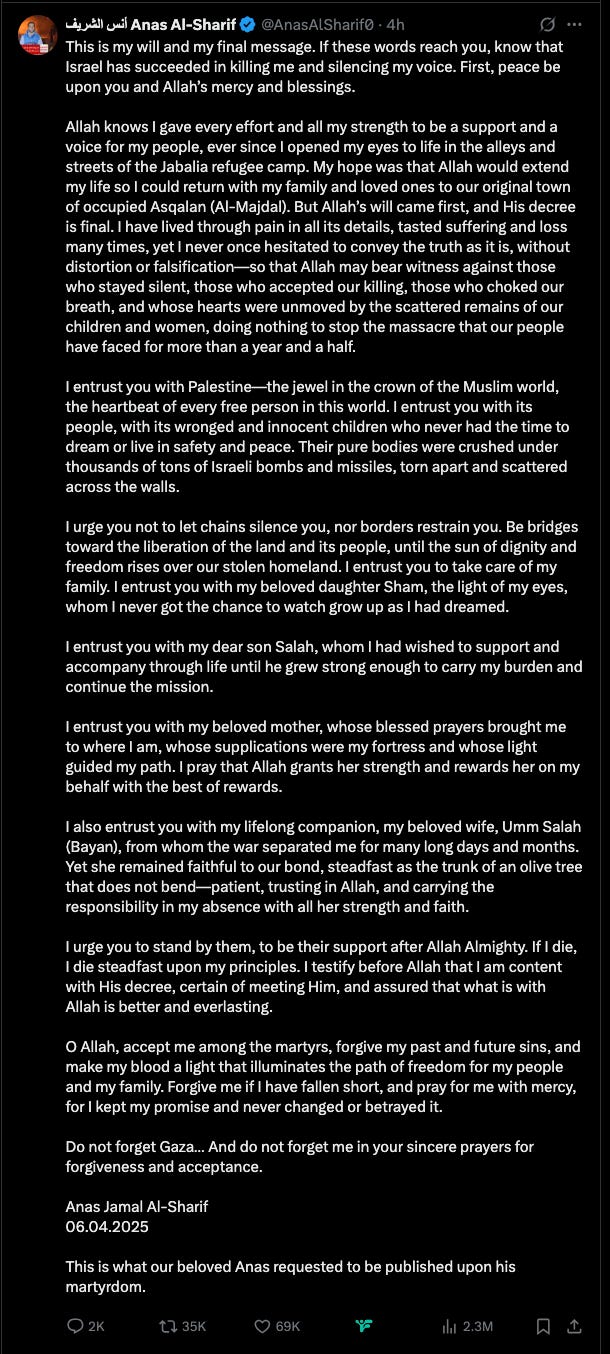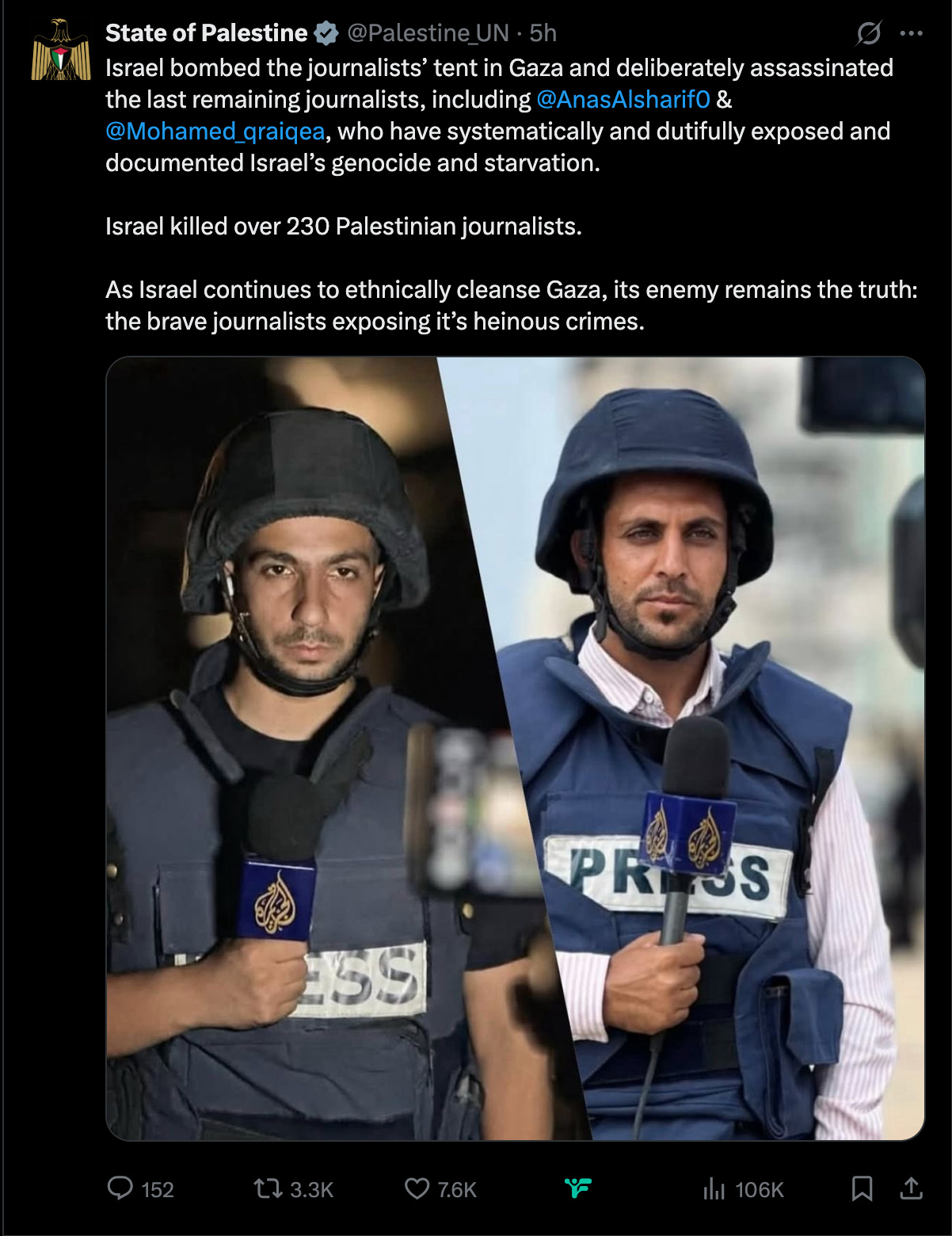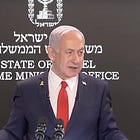Israeli Forces Kill Five Al Jazeera Journalists in Targeted Gaza Strike
Israeli forces killed five Al Jazeera journalists in a targeted airstrike on their media tent near Al-Shifa Hospital in Gaza City on Sunday night, marking the deadliest single attack on the news network's staff since the war began.
The victims included prominent correspondent Anas Al-Sharif, 28, fellow correspondent Mohammed Qreiqeh, cameramen Ibrahim Zaher and Moamen Aliwa, and their assistant Mohammed Noufal. Israel's military claimed responsibility for the attack and accused Al-Sharif of leading a Hamas unit, allegations the network and press freedom groups rejected as unsubstantiated.
"Israel's pattern of labeling journalists as militants without providing credible evidence raises serious questions about its intent and respect for press freedom," said Sara Qudah, regional director for the Committee to Protect Journalists. "Journalists are civilians and must never be targeted. Those responsible for these killings must be held accountable."
The killings bring the total number of journalists killed since the Israel-Gaza war began on Oct. 7, 2023, to 186, with at least 178 being Palestinians killed by Israeli forces, according to CPJ data.
Al-Sharif had become one of Al Jazeera's most recognizable voices from Gaza, continuing to report despite repeated Israeli threats against his life. In recent weeks, he had documented the starvation conditions affecting Gaza's population and the challenges facing journalists trying to cover the war.
"All of this is happening because my coverage of the crimes of the Israeli occupation in the Gaza Strip harms them and damages their image in the world," Al-Sharif told CPJ in July. "They accuse me of being a terrorist because the occupation wants to assassinate me morally."
Pattern of Threats Against Journalists
The attack came after months of what press freedom advocates described as a systematic campaign to discredit Palestinian journalists. On July 24, Israeli Defense Forces spokesperson Avichay Adraee publicly accused Al-Sharif of being a Hamas member since 2013, calling Al Jazeera "the most criminal and offensive channel."
Al-Sharif had warned that such accusations put his life in danger. "Adraee's campaign is not only a media threat or an image destruction; it is a real-life threat," he said in July.
The Committee to Protect Journalists had specifically warned about Israel's "smear campaign" against Al-Sharif, describing it as a potential "precursor to justify assassination."
In Sunday's statement claiming responsibility for the strike, Israel's military said Al-Sharif was "heading a Hamas cell" and "advancing rocket attacks against Israeli civilians and troops." The military provided no evidence to support these claims.
International Condemnation
The killings drew swift condemnation from international organizations, government officials and press freedom advocates worldwide.
"The killing of a journalist while working to inform the public is a loss felt far beyond one newsroom," said Mike Balsamo, president of the National Press Club in Washington. The organization called for a "thorough and transparent" examination of the circumstances surrounding the deaths.
Australian Senator David Shoebridge noted that the assassination came as Israel continues to prevent foreign journalists from entering Gaza, limiting independent coverage of the conflict.
"Now the entire Al Jazeera team in Gaza has been murdered by Israel with the killing of Anas al-Sharif, Mohammed Qreiqeh, Ibrahim Zaher and Mohammed Noufal," Shoebridge said. "Every day they try to hide the truth of the genocide they are committing."
The Palestinian mission to the United Nations described the journalists as among the "last remaining journalists" in Gaza who had "systematically and dutifully exposed and documented Israel's genocide and starvation."
Truth matters. Quality journalism costs.
Your subscription to The Evening Post (Australia) directly funds the investigative reporting our democracy needs. For less than a coffee per week, you enable our journalists to uncover stories that powerful interests would rather keep hidden. There is no corporate influence involved. No compromises. Just honest journalism when we need it most.
Not ready to be paid subscribe, but appreciate the newsletter ? Grab us a beer or snag the exclusive ad spot at the top of next week's newsletter.
Targeting of Media Coverage
Israeli political commentator Ori Goldberg described the killings as a deliberate attempt to prevent journalistic coverage of Israeli military operations in Gaza City.
"These journalists were Gaza's last hope of Israel's impending operation against Gaza City to be revealed and brought to the attention of the rest of the world," Goldberg told Al Jazeera from Tel Aviv. "When Israel assassinated Anas al-Sharif and the rest of his team, Israel was trying to intentionally prevent journalistic coverage of this impending operation."
The timing of the attack has raised concerns about Israel's plans for Gaza City, with reports suggesting major military operations may be imminent in the area.
Hani Mahmoud, an Al Jazeera correspondent reporting from Gaza City, said his colleagues had been documenting "the unfolding horror for the past 22 months and, more recently, the atrocity of the enforced starvation, the dehydration, malnourishment and death of many people, most of them children, inside health facilities in Gaza."
Impact on Press Freedom
The deaths highlight the extreme dangers facing journalists trying to cover the Gaza conflict. Unlike other war zones where international media can operate with some protection, Gaza has been largely sealed off to foreign journalists, leaving local Palestinian reporters to document the war's impact.
Munir al-Bursh, director general of the Gaza Health Ministry, paid tribute to Al-Sharif and Qreiqeh, saying they "were the eyes of Gaza, reporting the truth from the rubble." He said the journalists had told him they were "constantly threatened" by the Israeli military.
"Our grief for Anas al-Sharif and Mohammed Qreiqeh is grief for the truth and the free voice," al-Bursh said.
UN spokesperson Stephane Dujarric said the organization was "looking into what happened in Gaza today" and reiterated that "media workers should be able to carry out their work freely and without harassment, intimidation or fear of being targeted."
Broader Context of War
The attack on the Al Jazeera team occurred as the war in Gaza enters its 11th month. According to the latest figures, Israel's military campaign has killed at least 61,430 Palestinians and wounded 153,213. The Oct. 7, 2023, attacks by Hamas and other groups killed an estimated 1,139 people in Israel, with more than 200 taken captive.
Palestinian politician Mustafa Barghouti warned that Israeli Prime Minister Benjamin Netanyahu would continue what he called genocide in Gaza unless Western countries imposed sanctions.
"Netanyahu is getting away with it, as well as with other crimes committed in Gaza, assassinating journalists, killing doctors, nurses, professionals, civilians and children," Barghouti said from Ramallah. "More than 60,000 children have been killed or injured now in Gaza by the Israeli army."
Documented Pattern of Targeting
The Committee to Protect Journalists has documented what it describes as Israel's "longstanding pattern of accusing journalists of being terrorists without providing any credible proof." The organization has repeatedly called for accountability in cases where journalists have been killed or targeted.
CPJ noted that Al-Sharif was among several journalists whom Israel had previously alleged were Hamas members without providing evidence. The organization emphasized that such accusations, without substantiation, violate international protections for journalists covering armed conflicts.
Under international humanitarian law, journalists are considered civilians and cannot be directly targeted unless they take direct part in hostilities. Press freedom advocates argue that Israel's practice of labeling journalists as combatants without evidence violates these protections.
Legacy of Reporting
Al-Sharif's final reports focused on the dire humanitarian conditions in Gaza City, where residents face severe shortages of food, water and medical supplies. His work documented the impact of Israel's siege on civilian populations, particularly children and vulnerable groups.
The journalist's death comes as Gaza faces what UN officials have described as a humanitarian catastrophe, with much of the territory's infrastructure destroyed and aid deliveries severely restricted.
Goldberg, the Israeli commentator, called on international media to hold Israel accountable for the journalists' deaths and to reconsider how they report on the conflict.
"If journalists start ascribing responsibility to Israeli actions all over the world, I believe it would be a fitting homage to the memory of Anas and the other brave journalists who died in Gaza," he said.
The killings of the Al Jazeera journalists represent one of the deadliest single attacks on media workers during the current conflict, highlighting the extreme risks faced by those trying to document one of the world's most dangerous ongoing wars.
As the war continues with no clear end in sight, the deaths of Al-Sharif and his colleagues have intensified debates about press freedom, civilian protection and accountability in armed conflicts. Their deaths leave a significant gap in coverage from Gaza, where independent journalism has become increasingly dangerous and difficult to maintain.
Got a News Tip?
Contact our editor via Proton Mail encrypted, X Direct Message, LinkedIn, or email. You can securely message him on Signal by using his username, Miko Santos.
As well as knowing you’re keeping Mencari (Australia) alive, you’ll also get:
Get breaking news AS IT HAPPENS - Gain instant access to our real-time coverage and analysis when major stories break, keeping you ahead of the curve
Unlock our COMPLETE content library - Enjoy unlimited access to every newsletter, podcast episode, and exclusive archive—all seamlessly available in your favorite podcast apps.
Join the conversation that matters - Be part of our vibrant community with full commenting privileges on all content, directly supporting The Evening Post (Australia)
Not ready to be paid subscribe, but appreciate the newsletter ? Grab us a beer or snag the exclusive ad spot at the top of next week's newsletter.




